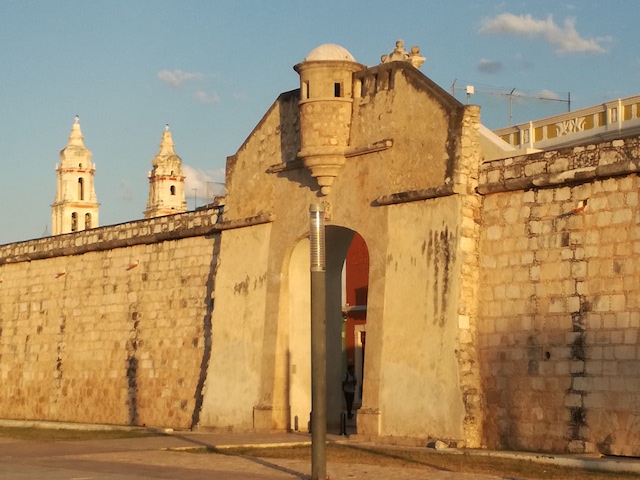|
Today's Opinions, Tomorrow's Reality
Trojan Horse By David G. Young Campeche, Mexico, February 26, 2019 -- American aid to Venezuela is nothing but a political tool. Let's pray it succeeds. The stone walls that surround this port city on the Gulf of Mexico were designed to protect Spanish residents from English raiders. For nearly two centuries during the age of piracy, war between England and Spain sent armed ships of privateers to raid, loot and destabilize Spanish settlements around the Caribbean basin. A ring of fortified cities spans the coast from Veracruz on the Gulf of Mexico past Campeche, then along Central America to Venezuela, where the stone defenses of Maracaibo still stand.
It is on the Venezuelan end of this old frontier that the English-Spanish rivalry continues today. The legacy pits the British imperial descendant of the United States against the Spanish imperial descendant of Venezuela in a standoff over who will control the country. Embattled authoritarian President Nicolas Maduro is holding strong against opposition leader Juan Guaido, who is backed by the United States, the European Union, and their New World allies. Spain's colonial descendants of Mexico and Uruguay have refused to join the English-speaking leaders of the anti-Maduro alliance. Now, as in the age of piracy, frontier defenses are proving key. Venezuelan security forces have blocked border crossings into Brazil, Colombia, and the Dutch West Indies to prevent convoys of aid from the United States from reaching their allies inside Venezuela. America's English-speaking forces are reportedly conducting reconnaissance on the borders of Venezuela, with military airplanes rather than the armed sloops of the pirate era. Juan Guaido slipped across the frontier last week in violation of a travel ban to join anti-Maduro allies at a meeting on Bogota. It is unclear how he plans to breech Venezuela's defenses on a return trip, and Maduro has threatened his prosecution should he return.1 The analogy to age of piracy only goes so far. Unlike then, when residents of walled cities like Campeche feared English raids that might break through their city walls, in Venezuela today the English-speakers at the gates have truck convoys of aid and not ships armed with cannons and filled with marauding pirates. Many Venezuelans would no doubt prefer to see the English-speaking foreigners get through, particularly if it would mean the toppling the increasingly dictatorial regime that rules them. And most tellingly, the alliance against Venezuela is not composed of English and Dutch-speakers, but includes Colombia, Peru, Argentina, Brazil and even Venezuela's old colonial master of Spain--the very nation that ordered the original coastal defenses against the English. But this truth has not stopped opponents of the American-led alliance from using history to discredit the anti-Maduro campaign. Left-wing leaders from around the region including Mexico's President Andres Manuel Lopez Obrador, the presidents of Uruguay and Cuba, and even America's Democratic Senator Bernie Sanders have refused to support the anti-Maduro campaign largely out of general suspicion of the history of heavy-handed American interference in Latin American affairs over the last 170 years. From the capture of Mexico City in 1847 to the invasion of Panama in 1989, Latin American countries have suffered from America's wrath more than they ever did from English raiders in the 17th and 18th centuries. To these skeptics and certainly to the Maduro regime, the aid trucks at the borders are nothing but Trojan horses brought by those seeking to topple their regime. On that point, they are undoubtedly right--the aid trucks are more about propaganda and pressuring Venezuelan officers to defect than they are about supplying aid. But this truth does little to distract from the ugly reality of the Maduro regime blocking aid to hungry Venezuelans while millions flee the nation in search of better lives. For the sake of the Venezuelan people, let us pray that Maduro's ad-hoc border defenses prove far less impregnable to trucks of American aid than the stone walls built by the Spanish were to the English pirates over 200 years ago. Related Web Columns: Chaos and Ruin, July 18, 2017 Notes: 1. Washington Post, Has the Venezuelan Opposition Lost Its Momentum? February 26, 2019 |

